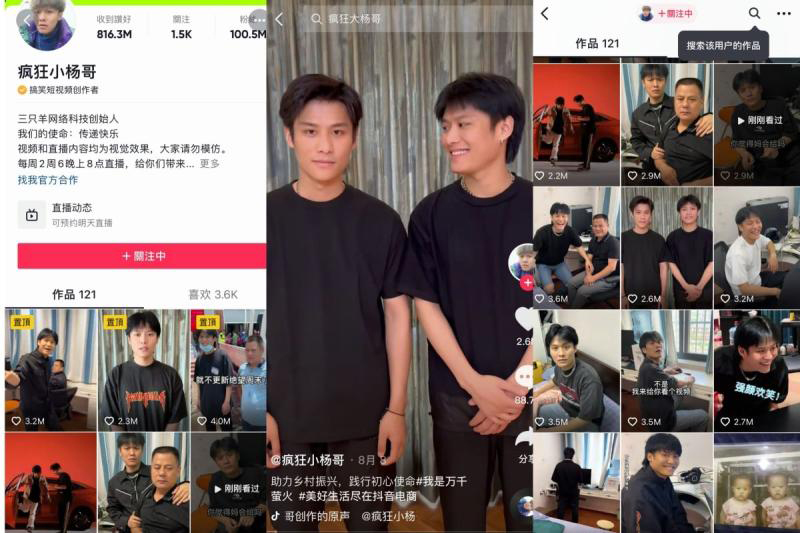
Twin brothers who star in their own video skits about daily life have become the most popular influencers on Douyin, the Chinese version of TikTok, amassing more than 100 million followers in four years.
Their account, under the name of the Crazy Yang Brothers, mainly consists of short video clips about daily life, with supporting roles from their father and girlfriends.
The twins, from Anhui province, originally started their short video career in 2015 on Kuaishou, the country's second largest video platform, according to a report by the Phoenix E-commerce Research Institute.
Born in 1995, the Yang's created their Douyin account in late 2018, quickly building a fan base with a short video series called "desperate weekend". The video stories, which often feature family situations like taking a new girlfriend to meet the parents, have struck a chord.
"Many short video teams have disbanded, please always stay together," one Douyin user commented.
The account is the first run by individuals to amass more than 100 million followers in China. Only Chinese state media accounts on Douyin have more followers.
People's Daily, the Communist Party's flagship mouthpiece, has 160 million followers on the platform and China Central Television (CCTV), the state-owned broadcaster, has about 150 million followers.
The popularity of Crazy Yang Brothers on Douyin, which has 600 million daily active users in China, exemplifies how short video has permanently changed China's internet landscape in the fields of entertainment, e-commerce and even information gathering.
The trend has seen people like the Yang brothers emerge as top social media influencers with huge commercial value, able to leverage their reach to generate income by promoting goods and hosting live-streaming sales sessions.
Although it started out as a lark, the Yang Brothers have since started running their account under a corporate entity, hosting live-streaming shows twice a week.
At the same time, Chinese internet platforms have become wary of over-reliance on top influencers because it can be risky if regulators step in to tighten controls on live streaming.
In one high profile case, Viya - whose real name is Huang Wei - was erased from China's cyberspace for alleged tax wrongdoings even though she was a top seller on Taobao, the e-commerce site run by Alibaba Group Holding, owner of the South China Morning Post.
"It is fair to say that China's social media platforms are dependent on influencers to drive traffic … but Douyin is a little less dependent given the power of their algorithm to keep users glued [to their screens]," said Mark Tanner, managing director at Shanghai-based research firm China Skinny.
In a change of strategy, Alibaba is promoting middle level influencers. The company reported a 684% year-on-year surge in presales generated by "new live-streaming hosts" in the first four hours of this year's Singles' Day shopping festival.
At the same time, Alibaba is retaining its top influencer Austin Li Jiaqi, whose return to Taobao Live after a three-month absence was celebrated by fans. Li's show was pulled after he showed what some described as a tank-shaped ice-cream the day before the anniversary of the Tiananmen Square crackdown of June 4, 1989.
Douyin has stepped up its e-commerce presence, hoping to translate its vast content pool into money. That is already paying off with strong sales results recorded on the platform for this year's Singles' Day shopping festival.
Separately, its overseas version TikTok is trying to gain ground in global e-commerce markets, including Indonesia, the United Kingdom and United States.
"TikTok can attribute much of its success to following an influencer-dependent model taken from its Douyin sibling," said Tanner. "But as a whole, although Western markets are engrossed with influencers, the culture isn't quite as pervasive as in China yet."







